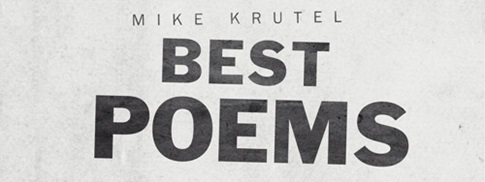This article first appeared as a post titled "Best Thing I’ve Read Today: Best Poems" at Vouched Books on 24 February 2014.
 Recently, Big Lucks (in conjunction with Narrow House Editions) published its first, official release: Mike Krutel’s chapbook Best Poems.
Recently, Big Lucks (in conjunction with Narrow House Editions) published its first, official release: Mike Krutel’s chapbook Best Poems.
The poems in Krutel’s chapbook (which is, incidentally, his first, official release as well) wander from line to line and image to image in strange, half-lit worlds; or, as the speaker of “Best Picture of Me in a Tub of Rotary Phones” says:
Of course, why would you want to escape? Because, indeed, getting lost within these poems ends up being a lot of fun. Take, for instance, the opening lines of the collection’s first poem, simply titled “Best”:
While they might concede to (or revel in) their waywardness, the speakers of these poems continually attempt to make sense of their worlds as they are led further astray by the night. And that sense comes by way of internal arrangement or some abstract, organizing principles of the poems; we're told as much in the following passages:
 Recently, Big Lucks (in conjunction with Narrow House Editions) published its first, official release: Mike Krutel’s chapbook Best Poems.
Recently, Big Lucks (in conjunction with Narrow House Editions) published its first, official release: Mike Krutel’s chapbook Best Poems.The poems in Krutel’s chapbook (which is, incidentally, his first, official release as well) wander from line to line and image to image in strange, half-lit worlds; or, as the speaker of “Best Picture of Me in a Tub of Rotary Phones” says:
You keep me waiting,Yes, Best Poems often reads as if it were the secret dream journal of a somnambulist “Wandering” through “worlds” filled with words; and in this world of language, both the speaker and the reader become lost in a playful labyrinth of “mirrors” so that they “don’t know / where to turn” in order to escape.
grown man that sleepwalks his
way down a well to linger. Wandering
full of worlds. I don’t know
where to turn or if there’s any
way out of this mirror. (22)
Of course, why would you want to escape? Because, indeed, getting lost within these poems ends up being a lot of fun. Take, for instance, the opening lines of the collection’s first poem, simply titled “Best”:
Tonight is night of no sleep.Like the somnambulist before him, the insomniac in the “night of no sleep” encounters an equally strange, half-lit world during the hour of the wolf. Haunted by both the surreal (e.g. “dandelions screaming”) and the mundane (e.g. “The cats rubs a glass frame”), the sleepwalker and the sleepless, the speaker and the reader, all become “comfortably lost / inside a small idea,” a small image, and a small world made up of the “sound outside” ourselves.
Cannonballs over the playground.
The cat rubs a glass frame off the mantle.
Somewhere there is a woman, comfortably lost
inside a small idea. You are that woman
and above you are your own best guesses.
How the vehicles are doing real things.
How the sun shoots its umbilical light around,
straight into night. There is sound outside.
It could be dandelions screaming
like engines or the causeways between
us. You are a small woman. I am holding
these individually wrapped letters
between the scaffold of my ribcage. All indications
say I should know better by now. (1)
While they might concede to (or revel in) their waywardness, the speakers of these poems continually attempt to make sense of their worlds as they are led further astray by the night. And that sense comes by way of internal arrangement or some abstract, organizing principles of the poems; we're told as much in the following passages:
I am with difficultyOf course, these and other “requirements for adequate reintegration” (14) are, perhaps, a bit of a dodge. For, in fact, if they serve a determinate purpose, it is not actually to access sense or plan an escape; rather, these alternate arrangements serve to ratchet up the playfulness of these poems, which, at night, glow beneath the “ambiguous moon” as it “does its dirty thing” (10).
rearranging patterns of static
that ferment around
our little heads. (10)
…
The moment became always
a reassembly of everything
different from everything, which is was. (21)

No comments:
Post a Comment